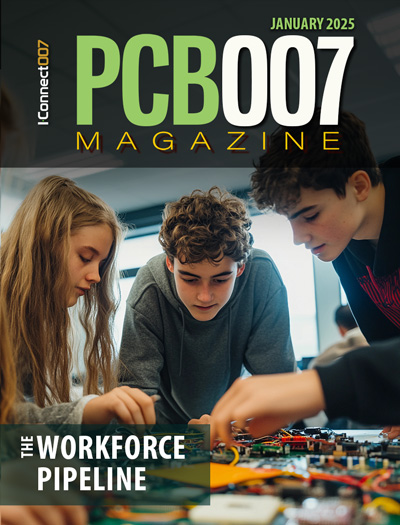-

- News
- Books
Featured Books
- pcb007 Magazine
Latest Issues
Current Issue
It's Show Time!
In this month’s issue of PCB007 Magazine we reimagine the possibilities featuring stories all about IPC APEX EXPO 2025—covering what to look forward to, and what you don’t want to miss.

Fueling the Workforce Pipeline
We take a hard look at fueling the workforce pipeline, specifically at the early introduction of manufacturing concepts and business to young people in this issue of PCB007 Magazine.

Inner Layer Precision & Yields
In this issue, we examine the critical nature of building precisions into your inner layers and assessing their pass/fail status as early as possible. Whether it’s using automation to cut down on handling issues, identifying defects earlier, or replacing an old line...
- Articles
- Columns
Search Console
- Links
- Media kit
||| MENU - pcb007 Magazine
Ushering in Ultrafast Cluster Electronics
April 5, 2019 | Hokkaido UniversityEstimated reading time: 1 minute
A new computational method can help fast track the development of tiny, ultrafast electronic devices made from small clusters of molecules.
Hokkaido University researchers have developed a computational method that can predict how clusters of molecules behave and interact over time, providing critical insight for future electronics. Their findings, published in the journal Scientific Reports, could lead to the creation of a new field of science called cluster molecular electronics.
Single molecule electronics is a relatively new, rapidly progressing branch of nanotechnology using individual molecules as electronic components in devices. Now, Hiroto Tachikawa and colleagues at Hokkaido University in Japan have developed a computational approach that can predict how clusters of molecules behave over time, which could help launch a new field of study for cluster molecule electronics. Their approach combines two methods traditionally used for quantum chemical and molecular dynamic calculations.
They used their method to predict the changes in a computer-simulated cluster of benzene molecules over time. When light is applied to the T-shaped benzene clusters, they reorganize themselves into a single stack; an interaction known as pi-stacking. This modification from one shape to another changes the cluster’s electrical conductivity, making it act like an on-off switch. The team then simulated the addition of a molecule of water to the cluster and found that pi-stacking happened significantly faster. This pi-stacking is also reversible, which would allow switching back and forth between the on and off modes.
When light is applied to the T-shaped benzene cluster in their computer simulation, they reorganized themselves into a single stack, changing its electrical conductivity. The addition of a molecule of water made the stacking occur significantly faster. (Tachikawa H., et al. Scientific Reports, February 20, 2019)
In contrast, previous studies had shown that the addition of a molecule of water to a single molecule electronic device impedes its performance.
“Our findings could usher in a new field of study that investigates the electronic performance of different numbers, types and combinations of molecular clusters, potentially leading to the development of cluster molecule electronic devices,” Tachikawa commented.
Suggested Items
Altium, AWS Partner to Train Indian Engineers in Electronics Design & Cloud
02/21/2025 | AltiumAltium LLC, a global leader in software and solutions for the electronics industry, announces a collaboration with Amazon Web Services (AWS) India Private Limited* to transform tech education across India.
The Test Connection Celebrates Its 45-Year Test and Training Legacy at IPC APEX EXPO 2025
02/20/2025 | The Test Connection Inc.The Test Connection Inc. (TTCI), a leading provider of electronic test and manufacturing solutions, is proud to announce its participation in the 2025 IPC APEX EXPO.
The Resurgence of European PCB Manufacturing: A Strategic Advantage
02/20/2025 | Jordan Labbe, ICAPE GroupThe global electronics landscape is undergoing a significant transformation. Driven by a confluence of factors, including geopolitical instability, supply chain disruptions, and a growing emphasis on agility and localized production, a renewed focus on European PCB manufacturing is emerging. This resurgence is not merely a trend; it represents a strategic advantage for companies seeking to navigate the complexities of the modern electronics market with multiple sourcing options, outside of China.
STMicroelectronics to Enable Higher-Performance Cloud Optical Interconnect in Datacenters and AI Clusters
02/20/2025 | STMicroelectronicsSTMicroelectronics, a global semiconductor leader serving customers across the spectrum of electronics applications, is unveiling its next generation of proprietary technologies for higher-performing optical interconnect in datacenters and AI clusters.
Revolutionizing Supply Chain: The Cofactr Solution
02/19/2025 | Marcy LaRont, I-Connect007Cofactr was co-founded by Phillip Gulley and Matthew Haber, originally as a small PCB assembly house. Recognizing a greater need, they transformed Cofactr into a supply chain execution platform that automates and optimizes manufacturing processes. The company integrates early design data with supply chain information to identify potential issues, provide risk abatement, and streamline procurement. I met with Phillip at DesignCon and asked him to walk me through the company’s background. He explained how Cofactr helps companies ensure compliance and achieve efficient material management, allowing engineering teams to focus on design rather than logistics.


